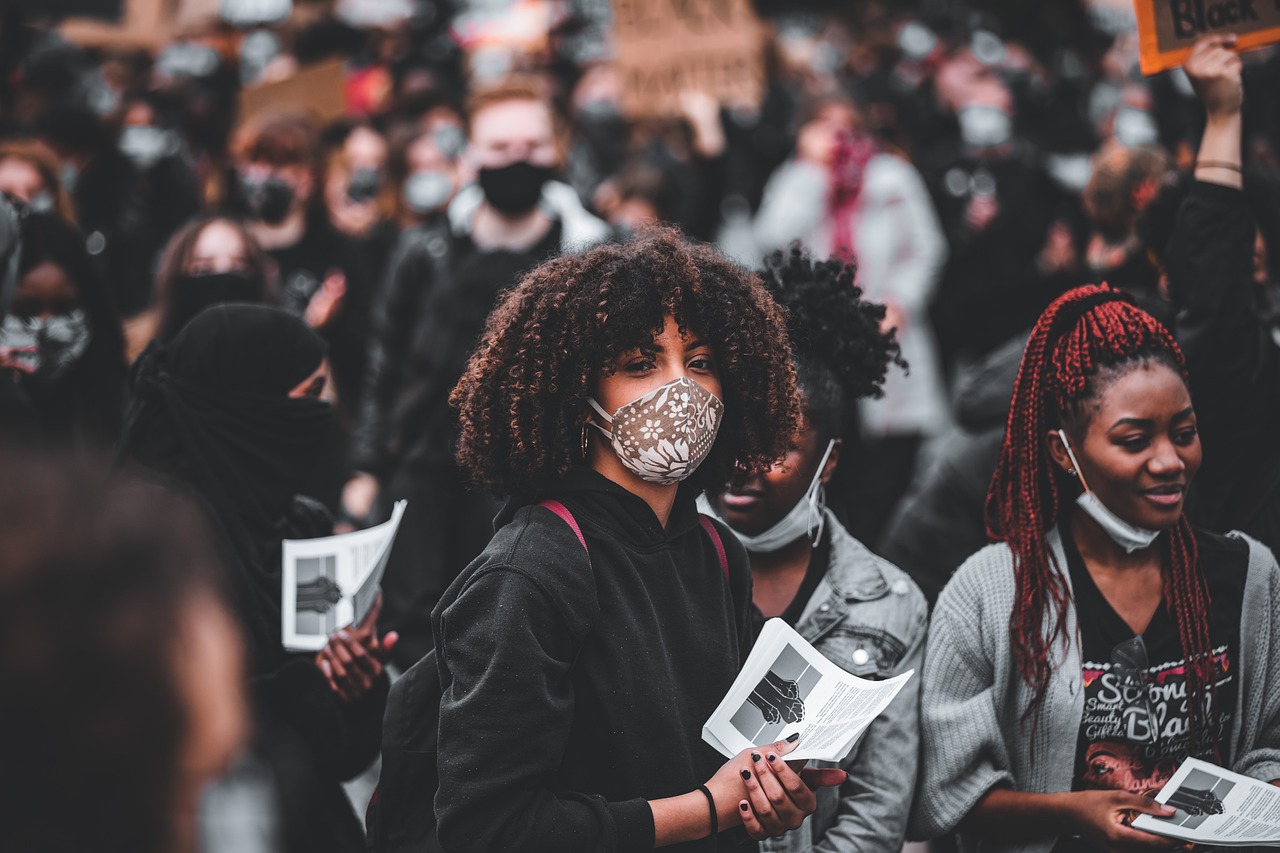Desigualdad social: La brecha entre ricos y pobres es abismal, con desigualdades en acceso a mejores oportunidades, educación, salud y vivienda digna. Este conflicto social en México se traduce en una realidad en la que las oportunidades de vida están condicionadas por factores como el lugar donde nacemos, nuestro género o nuestra etnia.
La falta de políticas sociales efectivas para abordar estas problemáticas en México ha llevado a un crecimiento desigual y sin control. La desigualdad se reproduce a través de generaciones, creando un ciclo difícil de romper. El acceso a la educación, por ejemplo, es un derecho fundamental que sigue siendo un lujo para muchos mexicanos.
La corrupción es otro factor que perjudica el desarrollo económico y social en el país. Cuando la institucionalidad no funciona como debería, se fomenta la ineficiencia y el desinterés por parte de los funcionarios públicos. La sociedad civil y los medios deben ser conscientes de este conflicto social en México y exigir cuentas a aquellos que tienen el poder para cambiar las cosas.
En cuanto a la justicia, es un tema delicado en México. La desigualdad también se manifiesta en el acceso a la justicia. Los más pobres no pueden ni siquiera llegar a los tribunales por falta de recursos económicos y de conocimiento sobre su derechos como personas. Esto crea una brecha entre las clases sociales que se puede llamar problema estatal.
Es importante recordar que los problemas actuales en Mexico no son solo resultado de la condición actual, sino también de la historia del país. La problemática social en México está ligada a la pobreza y la marginación de grupos específicos. El problema es sistémico y requiere un abordaje integral que tenga en cuenta las causas profundas y no solo sus síntomas.
La primera oportunidad para cambiar esta realidad es reconocer la complejidad de los problemas sociales en México y aceptar que no podemos abordarlos como si fuera un problema aislado. Debemos entender que todos ellos están interconectados y que el conflicto social en mexico es, en realidad, un reflejo más grande del problema estatal.
Brecha Social y Desigualdad
La brecha social es uno de los problemas más importantes y persistentes en México. La desigualdad entre ricos y pobres es abismal, y se manifiesta en diferentes aspectos de la vida cotidiana. Los problemas sociales en México están muy relacionados con esta brecha, ya que muchos mexicanos carecen de acceso a servicios básicos como agua potable, vivienda digna o educación de calidad.
La falta de oportunidades laborales y la pobreza extrema son algunos de los principales motivos por los cuales las personas se ven obligadas a migrar hacia ciudades más grandes en búsqueda de trabajo. Esto genera una presión importante sobre las infraestructuras urbanas, lo que a su vez contribuye al crecimiento desordenado de las ciudades y la falta de servicios básicos.
Por otro lado, la brecha social también se refleja en la escasa participación política de los ciudadanos más pobres. La sociedad civil y los medios deben ser conscientes de este problema y exigir cambios para que los ciudadanos puedan ejercer su derecho a voto sin obstáculos.
La brecha social es un tema fundamental en México y requiere una atención inmediata. Es necesario abordar las causas profundas de esta desigualdad y crear políticas públicas efectivas que logren cerrar la brecha entre ricos y pobres. Solo así será posible generar cambios positivos en la sociedad mexicana.
En este sentido, los problemas actuales en México no pueden considerarse aislados; es necesario entender que están interconectados y requiren un abordaje integral. La desigualdad y la pobreza no son solo cuestiones económicas, sino también sociales y políticas. Es necesario cambiar el paradigma y enfocarnos en crear una sociedad más justa y equitativa para todos.
Corrupción y Incompetencia Pública
La corrupción es otro de los problemas estatales que afectan a México. La falta de transparencia y la ineficiencia en la administración pública son factores que perjudican el desarrollo económico y social del país.
La corrupción se manifiesta en diferentes niveles, desde la falta de recursos asignados para proyectos que benefician al pueblo hasta la venta de influencias y la nepotismo. Esto crea un ambiente de desconfianza hacia las instituciones públicas y fomenta la ineficiencia y el despilfarro.
La corrupción no solo afecta a los ciudadanos, sino que también tiene una gran impacto en el tejido económico del país. La falta de inversiones y la escasez de recursos perjudican la capacidad empresarial y la creación de empleos dignos.
La incompetencia pública es otro problema que se ve estrechamente relacionado con la corrupción. La falta de profesionalismo y la ineficiencia en la administración pública pueden ser las causas que llevan a la desaparición de recursos publicos y al abandono de proyectos importantes para el desarrollo del país.
La corrupción y la incompetencia pública son problemas graves que afectan a México. Es necesario crear un sistema efectivo de control y accountability para evitar la corrupción y mejorar la eficiencia en la administración pública. Solamente así será posible generar cambios positivos en el país y mejorar las condiciones de vida de los ciudadanos.
La transparencia, la rendición de cuentas y la corresponsabilidad son fundamentales para que el Estado pueda ser efectivo y responder a las necesidades del pueblo. Es importante que los gobernantes y funcionarios públicos sean responsables y transparentes en sus acciones, ya que esto es fundamental para generar confianza y credibilidad en la población.
En este sentido, los problemas sociales en México no pueden considerarse aislados; es necesario entender que están interconectados y requiren un abordaje integral. La corrupción y la incompetencia pública son solamente dos de los múltiples problemas que affligan al país y requieren una atención inmediata y sostenida.
Violencia y Seguridad Ciudadana
La violencia es un problema grave en México, uno que afecta a muchas familias y comunidades. La violencia se manifiesta de diferentes maneras, desde la delincuencia organizada hasta la violencia doméstica.
La delincuencia organizada es un problema especialmente grave, ya que los carteles y las pandillas controlan grandes zonas del país y generan una cultura de la intolerancia y el miedo. La ausencia de estrategias efectivas para combatir esta violencia y la falta de confianza en las instituciones públicas hacen que muchos ciudadanos se sientan indefensos.
La violencia doméstica es otro aspecto del problema, ya que la gente está menos protegida en su propio hogar. Las mujeres y niños son especialmente vulnerables a la violencia física y emocional, lo que puede generar un trauma psicológico prolongado.
La seguridad ciudadana no es solo una cuestión de ley y orden, sino también de bienestar social. La percepción de inseguridad y el miedo a ser víctima del crimen son problemas que afectan a la salud mental y emocional de los ciudadanos. Esto puede generar un efecto en cascada que afecta a la productividad y la creatividad.
La falta de luz natural en las calles, la carencia de servicios públicos y la escasez de policías en algunas zonas contribuyen a crear un clima de inseguridad y miedo. La población se siente expuesta y desprotegida, lo que puede generar una cultura de la violencia.
La violencia y la seguridad ciudadana son problemas graves en México. Es necesario abordar estas problemáticas con estrategias efectivas y transparentes para restaurar la confianza en las instituciones públicas y proteger a los ciudadanos.
La prevención, el castigo y la reintegración de delincuentes organizados es fundamental para reducir la violencia. Además, es necesario investir en programas de prevención y atención a víctimas de violencia doméstica y cometer crímenes. La construcción de una sociedad más justa y equitativa requiere un abordaje integral que involucre a todos los actores sociales.
Pobreza e Inseguridad
La pobreza es uno de los problemas estatales más graves en México, ya que afecta a una gran parte de la población. La pobreza se define como la situación en la que una persona o familia no tienen suficientes recursos para cubrir sus necesidades básicas.
La pobreza puede ser causada por múltiples factores, incluyendo la falta de empleo, la inestabilidad económica y la falta de oportunidades educacionales. Esto puede generar un efecto en cascada que afecta a diferentes aspectos de la vida de las personas, desde el acceso a servicios básicos hasta la salud mental y emocional.
En México, la pobreza es especialmente grave en zonas rurales y pequeñas ciudades, donde la calidad de vida es muy baja y las oportunidades económicas son escasas. La falta de infraestructura, la carencia de servicios públicos y la escasez de recursos perjudican aún más a las personas que ya luchan por sobrevivir.
La inseguridad es otro problema estrechamente relacionado con la pobreza. Cuando las personas no tienen acceso a recursos básicos como alimentos, ropa y vivienda, se sienten expuestas y desprotegidas. La percepción de inseguridad puede generar un efecto en cascada que afecta a la salud mental y emocional de las personas.
La pobreza e inseguridad son problemas graves en México que requieren un abordaje integral. Es necesario investir en programas de educación, capacitación laboral y apoyo social para ayudar a las personas a mejorar su situación económica. Además, es necesario construir infraestructura, desarrollar servicios públicos y garantizar el acceso a recursos básicos para que las personas puedan vivir con dignidad.
La lucha contra la pobreza e inseguridad requiere un enfoque holístico que involucre a diferentes sectores sociales. Es necesario construir coaliciones entre gobierno, organizaciones no gubernamentales, comunidad y familia para abordar estos problemas de manera efectiva.
Los programas como el programa Prospera del gobierno mexicano, que busca ayudar a las personas en condición de pobreza a mejorar su situación económica, son un paso en la dirección correcta. Sin embargo, es necesario más inversión y apoyo para abordar el problema de raíz.
Además, es importante reconocer que la pobreza e inseguridad están estrechamente relacionadas con la violencia y la delincuencia organizada. Es necesario abordar estos problemas de manera integral para evitar la creación de un círculo vicioso que perjudica a las personas y a las comunidades.
Falta de Educación y Oportunidades
La falta de educación y oportunidades es otro problema grave en México, ya que tiene un gran impacto en la calidad de vida de las personas. La educación es fundamental para el desarrollo individual y social, pero muchos mexicanos no tienen acceso a una educación de calidad.
La escasez de recursos escolares, como materiales didácticos, tecnología y bibliotecas, hace que los estudiantes tengan dificultades para aprender y desarrollar habilidades. La falta de infraestructura escolar adecuada, como salas de clases con luz natural y ventilación adecuadas, también puede afectar la calidad de la educación.
La pobreza y el hacinamiento también son problemas comunes en los sistemas educativos mexicanos. Muchas escuelas rurales o de baja renta carecen de los recursos básicos para funcionar adecuadamente, lo que puede llevar a una falta de motivación y compromiso por parte de los estudiantes.
La deserción escolar es otro problema grave en México. Muchos jóvenes abandonan la escuela antes del final de su educación básica o media, lo que puede llevar a una vida laboral no calificada y una limitación para acceder a oportunidades económicas.
La falta de educación y oportunidades es un problema grave en México que requiere un abordaje integral. Es necesario invertir en la educación básica y media, en recursos escolares y en infraestructura adecuada para que los estudiantes tengan las herramientas necesarias para aprender y desarrollar habilidades.
Los programas de becas y financiamiento para la educación superior, como el programa PROYECTO 10% del PEF del gobierno mexicano, son un paso en la dirección correcta. Sin embargo, es necesario más inversión y apoyo para abordar el problema de raíz.
Además, es importante reconocer que la educación e oportunidades están estrechamente relacionadas con la lucha contra la pobreza e inseguridad. Es necesario abordar estos problemas de manera integral para evitar la creación de un círculo vicioso que perjudica a las personas y a las comunidades.
Los cambios estructurales en el sistema educativo, como la implementación del modelo de escuela basada en aprendizajes y la promoción de la inclusión educativa, son fundamentales para mejorar la calidad y accesibilidad de la educación en México.
Baja Calidad de Vida y Salud Pública
La baja calidad de vida y la salud pública son otros problemas graves en México.
Los mexicanos enfrentan desafíos significativos para acceder a servicios básicos como agua potable, saneamiento, vivienda digna y energía eléctrica. Esto puede generar un efecto en cascada que afecta a diferentes aspectos de la vida de las personas, desde la salud hasta la productividad laboral.
La calidad del aire es otro problema grave en México. La contaminación atmosférica es una amenaza para la salud pública, especialmente en áreas urbanas y industriales. Esto puede generar problemas respiratorios y cardiovasculares y aumentar el riesgo de enfermedades crónicas como la diabetes y las enfermedades cardíacas.
La mortalidad infantil y los embarazos adolescentes son otros problemas graves en México. La mortalidad infantil es un indicador importante de la calidad de vida y la salud pública. Los altos índices de mortalidad infantil en algunas regiones del país sugieren que hay desafíos importantes para acceder a servicios de maternidad y neonatal adecuados.
La violencia es otro problema grave en México que afecta significativamente la calidad de vida y la salud pública. La violencia interpersonal, como el maltrato doméstico y los asesinatos, puede generar una atmósfera de inseguridad y temor que perjudica a las personas y a las comunidades.
La baja calidad de vida y la salud pública son problemas graves en México que requieren un abordaje integral. Es necesario invertir en servicios básicos como agua potable, saneamiento, vivienda digna y energía eléctrica para mejorar la calidad de vida de los mexicanos.
Los programas de mejora del saneamiento y el agua potable, como el programa Saneamiento y Hidratación del gobierno mexicano, son un paso en la dirección correcta. Sin embargo, es necesario más inversión y apoyo para abordar el problema de raíz.
Además, es importante reconocer que la salud pública está estrechamente relacionada con la educación e oportunidades. Es necesario abordar estos problemas de manera integral para evitar la creación de un círculo vicioso que perjudica a las personas y a las comunidades.
Los cambios estructurales en políticas públicas, como la implementación del modelo de Atención Primaria en Salud y la promoción de la prevención de enfermedades crónicas, son fundamentales para mejorar la salud pública en México.
Poca Infraestructura y Desarrollo Territorial Desbalanceado
La poca infraestructura y el desarrollo territorial desbalanceado son problemas graves que afectan a buena parte de México.
La falta de infraestructura adecuada, como carreteras, caminos rurales, conexiones de energía eléctrica y servicios de agua potable, puede generar limitaciones significativas para el desarrollo económico y la calidad de vida en áreas rurales y marginadas. Esto puede llevar a una escasez de oportunidades laborales y de acceso a servicios básicos.
El desarrollo territorial desbalanceado refiere a la falta de invesimentos y recursos dirigidos hacia áreas con potencial socioeconómico, generando desigualdad y pobreza en diferentes partes del país. Esto puede llevar a una escasez de oportunidades laborales y de acceso a servicios básicos en áreas más pobres y marginadas.
La falta de infraestructura adecuada y el desarrollo territorial desbalanceado pueden generar un efecto en cascada que perjudica a las personas y a las comunidades, desde la educación hasta la salud y la productividad laboral. Esto puede llevar a una mayor brecha social y económica entre áreas ricas y pobres.
Entre los ejemplos de áreas con poca infraestructura y desarrollo territorial desbalanceado se encuentran:
- La región sureste de Chiapas, que es considerada como el estado más pobre del país.
- Los estados de Oaxaca y Veracruz, que tienen alta brecha social y económica entre áreas urbanas y rurales.
- Los estados de Guerrero y Michoacán, que se ven afectados por la violencia y la inseguridad.
La poca infraestructura y el desarrollo territorial desbalanceado son problemas graves que requieren un abordaje integral. Es necesario invertir en infraestructura adecuada y en programas de desarrollo socioeconómico para promover el crecimiento económico y mejorar la calidad de vida en áreas marginadas.
Los programas de desarrollo territorial, como el programa Desarrollo y Sustentabilidad del gobierno mexicano, son un paso en la dirección correcta. Sin embargo, es necesario más inversión y apoyo para abordar el problema de raíz.
Además, es importante reconocer que la poca infraestructura y el desarrollo territorial desbalanceado están estrechamente relacionados con la lucha contra la pobreza e inseguridad. Es necesario abordar estos problemas de manera integral para evitar la creación de un círculo vicioso que perjudica a las personas y a las comunidades.
Los cambios estructurales en políticas públicas, como la implementación del modelo de Desarrollo Territorial Sustentable y la promoción de la inversión en infraestructura para áreas marginadas, son fundamentales para mejorar la calidad de vida en México.
Crisis Educativa y Trabajo Infantil
La crisis educativa y el trabajo infantil son problemas graves que afectan a muchos niños y jóvenes en México.
Crisis Educativa:
La crisis educativa se refiere a la falta de recursos, infraestructura y calidad educacional en algunas regiones del país. Esto puede generar limitaciones significativas para el desarrollo socioeconómico y cultural de los niños y jóvenes.
Algunos ejemplos de la crisis educativa en México incluyen:
- Escasez de maestros capacitados: Un número significativo de maestros en México carecen de capacitación o experiencia adecuadas, lo que puede llevar a un bajo rendimiento académico.
- Falta de recursos educativos: Muchas escuelas mexicanas no tienen acceso a recursos educativos básicos como libros, materiales didácticos, tecnología y equipo para realizar actividades científicas.
- Desigualdad escolar: La desigualdad escolar se refiere a la disparidad en la calidad de la educación entre áreas urbanas y rurales. Las escuelas rurales suelen recibir menos recursos que las escuelas urbanas, lo que puede generar una brecha significativa en el rendimiento académico.
Trabajo Infantil:
El trabajo infantil se refiere a la explotación laboral de niños y jóvenes menores de 18 años. Esto es un problema grave en México, ya que muchos niños y jovene
Desempleo Juvenil sin Perspectiva de Mejora
El desempleo juvenil sin perspectiva de mejora es un problema grave que afecta a jóvenes mexicanos en edad laboral. Según datos del Instituto Nacional de Estadística y Geografía (INEGI), en 2020, el desempleo juvenil en México alcanzó un nivel del 17.6%.
El desempleo juvenil sin perspectiva de mejora se caracteriza por la falta de oportunidades laborales y educativas que permitan a los jóvenes desarrollar habilidades y competencias valiosas para incorporarse al mercado laboral. Esto puede generar una sensación de abandono y desesperanza entre los jóvenes, lo que puede afectar negativamente su bienestar emocional y social.
Algunos factores que contribuyen al desempleo juvenil sin perspectiva de mejora en México incluyen:
- La brecha entre la educación oficial y la realidad laboral: Muchos jóvenes mexicanos se gradúan con titulos universitarios, pero no tienen acceso a oportunidades laborales que correspondan a su nivel de estudios.
- La falta de habilidades y competencias transferibles: Los jóvenes necesitan desarrollar habilidades y competencias valiosas para incorporarse al mercado laboral. Sin embargo, muchos programas educativos no les dan las herramientas necesarias para hacerlo.
- La alta tasa de desempleo en áreas urbanas: Los jovenes que viven en áreas metropolitanas suelen tener menos oportunidades laborales que sus pares rurales.
El desempleo juvenil sin perspectiva de mejora tiene consecuencias graves para la sociedad mexicana. Algunos problemas relacionados incluyen:
- La delincuencia y el crimen: Los jóvenes con poca educación y habilidades transferibles pueden verse atraídos por actividades ilícitas como la delincuencia y el crimen.
- La violencia y la inseguridad: Los jovenes sin perspectiva laboral pueden verse obligados a involucrarse en actividades violentas para sobrevivir económicamente.
- La discriminación y la exclusión social: Los jóvenes con poco o ningún acceso al mercado laboral pueden experimentar discriminación y exclusión social a causa de su condición económica.
Es importante abordar este problema de manera integral, mediante políticas públicas y programas innovadores que brinden oportunidades educativas, laborales y de empoderamiento para los jóvenes mexicanos. Algunas estrategias que pueden ser efectivas incluyen:
- Crear programas de capacitación y formación Laboral: Los programas de capacitación y formación laboral pueden ayudar a los jóvenes a desarrollar habilidades y competencias valiosas.
- Fomentar la emprendimiento juvenil: El fomento del emprendimiento juvenile puede proporcionar oportunidades laborales innovadoras para los jóvenes.
- Mejorar la calidad de las escuelas y la educación superior: La mejoría en la calidad de las escuelas y la educación superior puede ayudar a garantizar que los jóvenes tengan acceso a habilidades y competencias valiosas.
El desempleo juvenil sin perspectiva de mejora es un problema grave que require un abordaje integral. Es necesario implementar políticas públicas y programas innovadores que brinden oportunidades educativas, laborales y de empoderamiento para los jóvenes mexicanos.
Crisis del Impacto Ambiental y Crisis Climática
La crisis ambiental y climática en México son problemas graves y complejos que afectan a la sociedad, la economía y el medio ambiente.
Crisis Ambiental:
La crisis ambiental se refiere a la degradación del medio ambiente y los efectos negativos sobre la salud humana y el bienestar. En México, se han registrado varios problemas ambientales graves, incluyendo:
- Contaminación del aire: La falta de regulaciones para reducir las emisiones contaminantes y la escasez de inversiones en medidas de mitigación de la polución aérea han llevado a una alta tasa de mortalidad atribuible a la polución en algunas ciudades.
- Agua sucia: El desperdicio inaceptable de residuos y el aumento de la masa contaminada en ríos, lagunas y acuiferos son problemas graves que afectan la salud humana y el bienestar.
- Pérdida de biodiversidad: La deforestación, la urbanización y la expansión agrícola han llevado a una pérdida significativa de la biodiversidad en México.
Crisis Climática:
La crisis climática se refiere a los efectos del cambio climático sobre el medio ambiente y la sociedad. En México, se han registrado varios problemas climáticos graves, incluyendo:
- Sequías e inundaciones: El cambio climático ha llevado a una mayor frecuencia y severidad de sequías e inundaciones en diferentes regiones del país.
- Incremento de temperatura: La temperatura promedio en México ha aumentado significativamente en los últimos años, lo que afecta negativamente la salud humana y el bienestar.
- Pérdida de hielo y nieve: El cambio climático ha llevado a una pérdida significativa de hielo y nieve en las montañas mexicanas, lo que tiene importantes implicaciones para la vida silvestre y la agricultura.
Los impactos de la crisis ambiental y climática en México son graves y pueden afectar negativamente la salud humana, la economía y el medio ambiente. Algunos de los efectos incluyen:
- Impactos en la salud: La contaminación del aire, el agua sucia y las condiciones climáticas extremas pueden aumentar la mortalidad y la morbidez.
- Impactos económicos: La crisis ambiental y climática pueden afectar negativamente la economía a través de la pérdida de productividad, la destrucción de infraestructuras y la disminución de la biodiversidad.
- Impactos sociales: La crisis ambiental y climática pueden llevar a la migración y el desplazamiento forzado de personas, lo que puede afectar negativamente la estabilidad social.
Es importante abordar esta crisis de manera integral y tomar medidas para reducir las emisiones contaminantes, conservar el medio ambiente y promover la sostenibilidad en México. Algunas estrategias que pueden ser efectivas incluyen:
- Implementar políticas públicas ambientales: Los gobiernos deben implementar políticas públicas ambientales efectivas para reducir las emisiones contaminantes, conservar el medio ambiente y promover la sostenibilidad.
- Fomentar la educación y la conciencia: La educación y la conciencia sobre los problemas ambientales y climáticos pueden ser clave para cambios en el comportamiento humano y la adopción de prácticas sustentables.
- Invertir en tecnologías renovables: La inversión en tecnologías renovables como la energía solar y eólica puede ayudar a reducir las emisiones contaminantes y promover la sostenibilidad.
La crisis ambiental y climática en México es un problema grave que requiere un abordaje integral. Es necesario implementar políticas públicas ambientales efectivas, fomentar la educación y la conciencia, invertir en tecnologías renovables y promover la sostenibilidad para proteger el medio ambiente y garantizar el bienestar de las personas.
Conclusión
México enfrenta un conjunto de desafíos socioeconómicos complejos que afectan negativamente a la sociedad, la economía y el medio ambiente. La crisis ambiental y climática es un problema grave que requiere un abordaje integral.
Es importante que los gobiernos, las empresas y la sociedad civil trabajen juntos para implementar políticas públicas ambientales efectivas, reducir las emisiones contaminantes y promover la sostenibilidad. Además, es crucial educar y concienciar a la población sobre los problemas ambientales y climáticos.
A continuación se presentan algunas sugerencias para abordar estos desafíos:
- Establecer políticas públicas ambientales efectivas.
- Invertir en tecnologías renovables como la energía solar y eólica.
- Promover la educación y la conciencia sobre los problemas ambientales y climáticos.
- Implementar programas de gestión sostenible de residuos y agua potable.
- Fomentar la conservación de la biodiversidad y el medio ambiente.
- Desarrollar infraestructuras verdes y sostenibles.
- Fortalecer la educación ambiental en las escuelas y comunidades.
- Promover la cultura del reciclaje y la reutilización.
- Fortalecer la participación de la sociedad civil en la gestión y protección del medio ambiente.
- Fomentar la cooperación internacional para abordar los desafíos ambientales globales.
México puede superar estos desafíos con una combinación de políticas públicas efectivas, educación y conciencia, inversión en tecnologías renovables y gestión sostenible.










